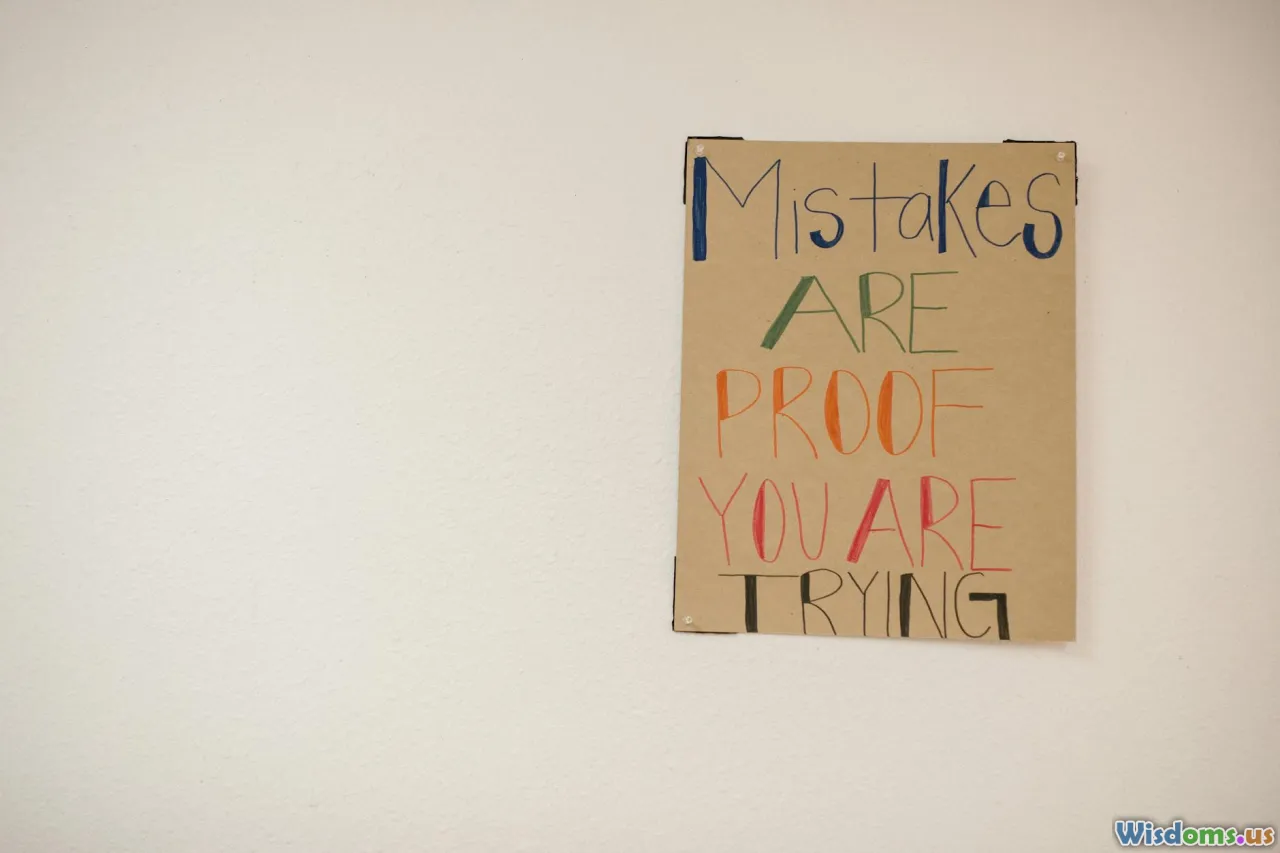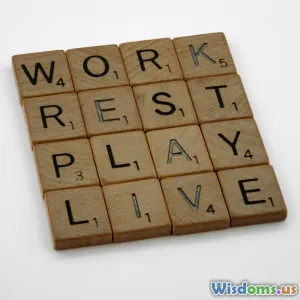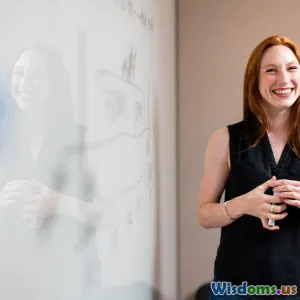
Balancing Parenthood With Promotions My Journey and Mistakes
16 min read Lessons learned from juggling parenting and career promotions, sharing candid mistakes and valuable strategies. (0 Reviews)
Balancing Parenthood With Promotions: My Journey and Mistakes
Managing both a flourishing career and the ever-changing adventures of parenthood is a story more common—and complicated—than many realize. As I navigated my own journey from welcoming my first child to fighting for, and eventually achieving, significant work promotions, I encountered challenges and revelations I never expected. Along the way, I made mistakes, learned invaluable lessons, and developed actionable strategies for those walking a similar path. Here’s a candid look at what it truly means to strive for upward mobility at work while being present for your family.
The First Wake-Up Call: Accepting That You Can’t Do It All

In the months following my first promotion interview after becoming a parent, I realized that the narrative of “having it all” was more myth than reality. During that period, I felt immense pressure—professionally and personally—to be everything for everyone.
For example, as a new mother returning to work, I pushed myself to maintain my pre-baby productivity levels while simultaneously handling night feedings. I volunteered for extra projects, barely declining requests. Inevitably, this resulted in fatigue and a couple of notable mistakes at work (missed deadlines, overlooked emails) and at home (missing my son’s first swim class).
Key lesson: Acknowledge early that you cannot be – and do – everything at the highest standard. Set realistic expectations for yourself, and be honest about your limitations; it’s a sign of strength, not failure. Focusing your energy on the most impactful actions—at home and professionally—yields better results and protects your well-being.
Implementing Boundaries: The Art of Saying No (and Meaning It)

One of my pivotal mistakes was not establishing clear boundaries early on. I often accepted late calls with colleagues based in other time zones, replied to emails during family meals, and sacrificed sleep for project catch-up.
The cost? Chronic exhaustion and growing resentment from my partner, who began picking up the slack. The turning point came when my child tearfully asked, “Mommy, why are you always on your phone?”
I responded by:
- Communicating Non-Negotiables: I blocked out school pickup and dinner time on my work calendar, signaling to my team I’d be unavailable.
- Distinguishing Between Urgent and Important: Not every email warranted an immediate response. Learning to delegate or defer non-critical matters allowed me more protected family time.
- Protecting Rest: I set a hard stop each night, powering down devices well before bedtime.
Implementing firm boundaries didn’t stall my career; rather, it improved my focus and reliability. My team learned to respect these windows, and my productivity during office hours increased dramatically.
Negotiating Flexibility: Advocacy and Allyship At Work

I initially made the mistake of assuming that flexible work arrangements would be viewed as a lack of ambition. Afraid to speak up, I soldiered through a traditional schedule, struggling with childcare logistics and unpredictable commutes. The tipping point was when a daycare emergency forced me to leave a major client meeting—something I could have managed differently had I addressed flexibility proactively.
When I finally advocated for myself, I discovered that many colleagues faced similar challenges—some quietly, others very loudly. What worked for me:
- Make the Business Case: I quantified how adjusting my schedule could increase my efficiency (fewer late arrivals, more focused work times).
- Align With Managers’ Interests: I explained how this would decrease absenteeism and improve deliverable quality, framing flexibility as a win for the company.
- Find and Build Allies: Partnering with peers pursuing the same goal amplified our voices and created lasting policy changes, like the adoption of core collaboration hours.
Real flexibility isn’t simply about remote work or asynchronous hours; it’s about creating a culture where open discussions of personal needs become part of the norm.
Managing Guilt: The Hidden Obstacle

Guilt became a near-constant companion throughout this journey. Some days I worried that my dedication at work shortchanged my child. Other times, I felt guilty towards my team if a parent-teacher conference meant rescheduled meetings. The pressure of being both a highly competent employee and a nurturing parent was an emotional tug-of-war.
To move past this, I learned to:
- Practice Radical Self-Compassion: I reframed guilt as a natural response and challenged myself to identify wins each week on both fronts—big or small.
- Connect With Other Parents: Honest conversations with colleagues normalized these feelings and swapped shame for support.
- Set Realistic Priorities: Missing the occasional office happy hour or field trip was neither the end of my career nor my child's childhood. Progress, not perfection, became my guiding principle.
When I let go of the guilt, my relationships—with my child, my partner, and myself—improved. I became a better leader, modeling vulnerability and healthy self-management for my team.
Developing Career Resilience: How I Turned Setbacks Into Stepping Stones

Pursuing promotions while juggling parental duties meant enduring setbacks—missed opportunities, failed projects, even negative performance feedback. One memorable incident involved a client misunderstanding that led to losing a major account. Initially, I berated myself, fearing my competing commitments made me a lesser leader.
Eventually, I shifted my mindset:
- Own the Mistake: I scheduled a meeting with my manager, accepted responsibility, and proposed a plan for regaining client trust.
- Seek Feedback (Not Approval): Rather than soliciting validation, I asked for actionable coaching on balancing complex demands. My manager suggested time-blocking for high-focus work and regular check-ins to track progress.
- Reflect and Adjust: Each setback fueled introspection. What systems failed? Where was I stretched too thin? How could I better communicate competing deadlines?
Gradually, each mishap became a catalyst for learning. Promotions came not from avoiding mistakes but demonstrating that I could recover thoughtfully and adapt.
Strategic Networking: Creating a Supportive Village

In my early promotion attempts, I mistakenly believed that merit alone would speak for me. However, the candid advice of an executive mentor—herself a mother of three—transformed my trajectory: "Build your village early and often. If no one knows your story, your accomplishments may blend into the background."
I consciously invested in my professional network by:
- Joining Parent Resource Groups: These communities offered practical advice, emotional support, and advocacy for family-friendly policies. I found a mentor who sponsored me for visible assignments.
- Volunteering for Cross-Department Projects: These efforts built relationships outside my immediate team and showcased my skills in new domains.
- Making My Work—and Struggles—Visible: I shared parenting wins and challenges during town halls, showing vulnerability that resonated with others in the same boat.
The result? Real allies who championed my promotion—sometimes in rooms I wasn’t in—and resources for coping with unforeseen obstacles at home and at work.
Redefining Success: Moving Beyond Traditional Markers

Initially, I measured achievement by quick promotions and employee-of-the-month awards, interpreting any detour as failure. Parenthood, though, redefined what mattered.
Some pivotal changes in my outlook:
- Purpose Over Pace: Elevation at work still excited me, but milestones at home (first steps, school presentations) found their place on my metaphorical achievement board.
- Quality of Presence: Highly-productive weeks where I missed every bedtime no longer counted. Instead, being emotionally and physically present during family moments carried equal, if not greater, weight.
- Legacy Thinking: I began to ask, "What example am I setting for my child in handling ambition, setbacks, and self-care?"
Now, my greatest pride comes not from title alone, but in modeling for my child what it means to lead, persevere, and balance priorities—even imperfectly.
Systems and Hacks That Actually Worked

No journey is complete without the actual tools that turned chaos into something resembling order. Some favorites, tested through trial and (plenty of) error:
- Shared Digital Calendars: My partner and I synced family and work events (yes, doctor’s appointments and crucial project deadlines live side by side). Team leaders also benefit from calendar transparency.
- "Power Hour" Technique: At the start or end of each day, I batch deep-work tasks when the house is quiet, maximizing brainpower before fatigue or distraction set in.
- Meal Prep Sundays: Dedicating a few hours on weekends to pre-cook meals or snacks minimized weekday stress and freed up precious evening hours.
- Automated Reminders: From birthday parties to quarterly evaluations, cloud-based lists and reminders kept a thousand details from escaping us.
- Kid-Friendly Office Setup: For inevitable unexpected sick days, I curated a small box of quiet toys and snacks to allow Zoom participation without constant interruptions.
The aim? Not perfection, but stability—and the reserve to pivot when nothing goes as planned.
Honest Conversations: Talking With Family and Managers

Transparent communication became a constant accompaniment to every strategy. Key elements included:
- With My Partner: Weekly sit-downs to align on household logistics and emotional needs—the “state of the union.” Our motto: "Assume good intent, ask for support."
- With My Child: Tailoring explanations to his age—why Mom had to miss a recital, or how work helps our family. Example: Drawing pictures of what we do at work each day led to sharing and understanding.
- With Managers and Reports: Candid discussions on workload and capacity, describing trade-offs openly. I wrote a personal "user manual" outlining my working style, optimal collaboration times, and family constraints.
These conversations, while sometimes awkward, preempted misunderstandings and created a culture of empathy on all fronts.
Embracing Imperfection and Finding Joy

If there’s one ultimate lesson from my journey balancing parenthood and professional ambition, it’s this: embrace imperfection. At times, the balancing act will tilt sideways—missed performances, forgotten assignments, an impromptu dinner of breakfast cereal. What matters is finding joy in the process, and surface the small daily victories over guilt and expectations.
On hard days, I focus on gratitude:
- For a workplace that values flexibility (after much advocacy)
- For a partner that shares chores and emotional work
- For the camaraderie of other parents who reach out with reassurances and humor
- For a child who’s learning every day what it means to work, love, and try again
In sharing my unvarnished story—successes alongside every blunder—I hope to inspire others who are balancing rising careers and growing families. Know that in pursuing both your ambitions and your love for your family, you’re not alone—and that both deserve to be celebrated, exactly as they are.
Rate the Post
User Reviews
Popular Posts




















